Cultural Capital and Learning Strategies: A Bourdieuian Perspective on Elementary Education
(1) Program Studi Pendidikan Agama Islam, STAI Syubbanul Wathon Magelang
(2) Fakultas Ilmu Tarbiyah dan Keguruan, UIN Walisongo Semarang
(3) Fakultas Ilmu Tarbiyah dan Keguruan, UIN Walisongo Semarang
(4) Program Studi Pendidikan Agama Islam, STAI Syubbanul Wathon Magelang
(*) Corresponding Author
Abstract
Abstract
This study aims to explore the relationship between cultural capital and teaching strategies in the context of primary education, employing a Bourdieuian perspective. The focus of this research is on teachers at Madrasah Ibtidaiyah Negeri in Magelang Regency. A qualitative method was utilized, with data collected through in-depth interviews and classroom observations. The findings reveal that teachers’ cultural capital, including their knowledge, values, and experiences, significantly influences their choice and implementation of teaching strategies in the classroom. Teachers with a rich cultural capital tend to adopt more innovative and adaptive strategies, which enhance student engagement in the learning process. Furthermore, the study identifies challenges faced by teachers in integrating cultural capital into their teaching practices. These findings provide helpful guidance in the development of educational policies and teacher training programs, ultimately improving the quality of education in Madrasah Ibtidaiyah.
Keywords: cultural capital, teaching strategies, Bourdieuian perspective, Madrasah Ibtidaiyah.
Abstrak
Penelitian ini bertujuan untuk mengeksplorasi hubungan antara modal budaya dan strategi pembelajaran dalam konteks pendidikan dasar, dengan pendekatan perspektif Bourdieu. Fokus penelitian ini adalah pada guru-guru di Madrasah Ibtidaiyah Negeri di Kabupaten Magelang. Metode penelitian yang digunakan adalah kualitatif dengan teknik pengumpulan data melalui wawancara mendalam dan observasi. Hasil penelitian menunjukkan bahwa modal budaya yang dimiliki oleh guru, seperti pengetahuan, nilai-nilai, dan pengalaman, berdampak dalam menentukan pilihan dan penerapan strategi pembelajaran di kelas. Guru yang memiliki modal budaya yang kaya cenderung menggunakan strategi yang lebih inovatif dan adaptif, yang dapat meningkatkan keterlibatan siswa dalam proses pembelajaran. Selain itu, penelitian ini juga mengidentifikasi tantangan yang dihadapi oleh guru dalam mengintegrasikan modal budaya ke dalam praktik pembelajaran. Temuan ini dapat memberikan wawasan bagi pengembangan kebijakan pendidikan dan pelatihan guru, serta meningkatkan kualitas pembelajaran di Madrasah Ibtidaiyah.
Kata kunci: modal budaya, strategi pembelajaran, Bourdieuian perspective, Madrasah Ibtidaiyah.
Full Text:
PDFReferences
Abdalla, H., & Moussa, A. (2024). Culturally Responsive Teaching: Navigating Models and Implementing Effective Strategies. Acta Pedagogia Asiana, 3(2), 91–100. https://doi.org/10.53623/apga.v3i2.432
Álvarez-Valdivia, I. M., & González-Montoto, I. (2018). Teachers’ intercultural competence: a requirement or an option in a culturally diverse classroom? International Journal of Inclusive Education, 22(5), 510–526. https://doi.org/10.1080/13603116.2017.1377298
Anlimachie, M. A., Abreh, M. K., Acheampong, D. Y., Samuel, B., Alluake, S., & Newman, D. (2023). Enacting culturally responsive pedagogy for rural schooling in Ghana: A school-community-based enquiry. Pedagogy, Culture & Society, 33(1), 141–159. https://doi.org/10.1080/14681366.2023.2205861
Bates, G., & Connolly, S. (2024). Exploring teachers’ views of cultural capital in English schools. British Educational Research Journal, 50(3), 1350–1366. https://doi.org/10.1002/berj.3965
Bourdieu, P. (1977). Outline of a Theory of Practice. Cambridge: Cambridge University Press. https://doi.org/10.1017/CBO9780511812507
Bourdieu, P. (1984). Distinction: A Social Critique of the Judgement of Taste. London: Harvard University Press.
Bourdieu, P. (1986). The Forms of Capital. In Handbook of theory and research for the sociology of education. New York: Greenwood Press.
Bourdieu, P. (1990). The Logic of Practice. California: Stanford University Press.
Choudry, S. (2023). Power relations within division of labor – the key to empowering learners from marginalized backgrounds in mathematics classrooms. Mind, Culture, and Activity, 1–17. https://doi.org/10.1080/10749039.2023.2287448
Cottle, M. (2022). What can Bourdieu offer the ethnographer in neoliberal times: reflecting on methodological possibilities. Ethnography and Education, 17(4), 331–347. https://doi.org/10.1080/17457823.2022.2062676
Creswell, J. W. (2017). Qualitative Inquiry and Research Design: Choosing Among Five Approaches. California: Sage publications Inc.
Cruz, R. A., Manchanda, S., Firestone, A. R., & Rodl, J. E. (2020). An Examination of Teachers’ Culturally Responsive Teaching Self-Efficacy. The Journal of the Teacher Education Division of the Council for Exceptional Children, 43(3), 197–214. https://doi.org/10.1177/0888406419875194
Davies, S. (2024). Cultural capital—field connections for three populations of Chinese students: a theoretical framework for empirical research. Chinese Sociological Review, 56(3), 261–284. https://doi.org/10.1080/21620555.2024.2307480
Eryilmaz, N., & Sandoval-Hernández, A. (2021). The relationship between cultural capital and the students’ perception of feedback across 75 countries: Evidence from PISA 2018. International Journal of Educational Research, 109, 101803. https://doi.org/10.1016/j.ijer.2021.101803
Ewulley, F., Anlimachie, M. A., Abreh, M. K., & Mills, E. E. (2023). Understanding the nexus of school types, school cultures and educational outcomes and its implication for policy and practice. International Journal of Educational Research, 121, 102237. https://doi.org/10.1016/j.ijer.2023.102237
Grenfell, M. (2019). Bourdieu and Education. In Oxford Research Encyclopedia of Education. London: Oxford University Press. https://doi.org/10.1093/acrefore/9780190264093.013.259
Gube, J. (2024). Exploring pedagogic discourses of cultural responsiveness: a tale of two classrooms. Pedagogy, Culture & Society, 32(2), 553–571. https://doi.org/10.1080/14681366.2022.2063366
Gulya, N., & Fehérvári, A. (2024). Fostering culturally responsive pedagogy related competencies among pre-service teachers: a systematic review of the recent research literature. Research Papers in Education, 39(2), 348–378. https://doi.org/10.1080/02671522.2023.2228312
Hakim, M. A. (2024). Maintaining Local Languages in the Elementary Schools in Indonesia through Pierre Bourdieu ’ s Cultural Reproduction Strategies. Al Ibtida: Jurnal Pendidikan Guru MI, 11(1), 97–112. https://doi.org/10.24235/al.ibtida.snj.v11i1.17345
Hu, A. (2023). Cultural capital and higher education inequalities in contemporary China. Sociology Compass, 17(8). https://doi.org/10.1111/soc4.13102
Husni, M., Al Ihwanah, A. I., Wibowo, D. R., & Lubis, M. A. (2023). Merdeka Curriculum Based EBA Learning Model in Elementary Schools. Al Ibtida: Jurnal Pendidikan Guru MI, 10(2), 275–287. https://doi.org/10.24235/al.ibtida.snj.v10i2.15069
Jackson, J. (2022). Qualifications, quality, and habitus : using Bourdieu to investigate inequality in policies for early childhood educators. British Journal of Sociology of Education, 43(5), 737–753. https://doi.org/10.1080/01425692.2022.2057926
Jheng, Y., Lin, C., & Liao, Y. (2023). The way cultural capital works: A meta-analysis of the effects of cultural capital on student’s reading performance. International Journal of Educational Research, 122, 102259. https://doi.org/10.1016/j.ijer.2023.102259
Jin, H., Jiao, S., Ma, X., & Xia, Y. (2024). Cultural capital as a predictor of school success: evidence and gender differences in Chinese middle schools. Humanities and Social Sciences Communications, 11(1), 858. https://doi.org/10.1057/s41599-024-03382-x
Kumar, R., Zusho, A., & Bondie, R. (2018). Weaving Cultural Relevance and Achievement Motivation Into Inclusive Classroom Cultures. Educational Psychologist, 53(2), 78–96. https://doi.org/10.1080/00461520.2018.1432361
Kumar, T. (2018). Advancing Culturally Relevant Pedagogy in a Secondary Methods Course. Multicultural Perspectives, 20(2), 111–116. https://doi.org/10.1080/15210960.2018.1447125
Lang, S. N., Tebben, E., Luckey, S. W., Hurns, K. M., Fox, E. G., Ford, D. Y., … Pasque, P. A. (2024). Early childhood teachers’ dispositions, knowledge, and skills related to diversity, inclusion, equity, and justice. Early Childhood Research Quarterly, 67, 111–127. https://doi.org/10.1016/j.ecresq.2023.12.005
Liu, L. B., & Li, Q. (2019). Culturally and Ecologically Sustaining Pedagogies: Cultivating Glocally Generous Classrooms and Societies. American Behavioral Scientist, 63(14), 1983–2006. https://doi.org/10.1177/0002764219850865
Lochmiller, C. (2021). Conducting Thematic Analysis with Qualitative Data. The Qualitative Report, 26(6), 2029–2044. https://doi.org/10.46743/2160-3715/2021.5008
Loes, C. N., Culver, K. C., & Trolian, T. L. (2018). How Collaborative Learning Enhances Students’ Openness to Diversity. The Journal of Higher Education, 89(6), 935–960. https://doi.org/10.1080/00221546.2018.1442638
Mahmud, S., Sri Rahmi, S. R., Nufiar, N., Nurbayani, N., & Nurdin, R. (2023). Building Students’ Character Based on Maqāṣid al-Sharī’ah: Perspectives of Parents, Teachers, and Community Members in Banda Aceh. Samarah: Jurnal Hukum Keluarga Dan Hukum Islam, 7(3), 1803. https://doi.org/10.22373/sjhk.v7i3.17708
Mikus, K., Tieben, N., & Schober, P. S. (2020). Children’s conversion of cultural capital into educational success: the symbolic and skill-generating functions of cultural capital. British Journal of Sociology of Education, 41(2), 197–217. https://doi.org/10.1080/01425692.2019.1677454
Miller, B. G., & Roehrig, G. (2018). Indigenous cultural contexts for STEM experiences: snow snakes’ impact on students and the community. Cultural Studies of Science Education, 13(1), 31–58. https://doi.org/10.1007/s11422-016-9738-4
Morgan, H. (2024). Using Triangulation and Crystallization to Make Qualitative Studies Trustworthy and Rigorous. The Qualitative Report, 29(7), 1844–1856. https://doi.org/10.46743/2160-3715/2024.6071
Oxford, R. L., & Gkonou, C. (2018). Interwoven: Culture, language, and learning strategies. Studies in Second Language Learning and Teaching, 8(2), 403–426. https://doi.org/10.14746/ssllt.2018.8.2.10
Pang, V. O., Alvarado, J. L., Preciado, J. R., & Schleicher, A. R. (2021). Culturally Relevant Education: Think Local Within a Holistic Orientation. Multicultural Perspectives, 23(1), 3–16. https://doi.org/10.1080/15210960.2021.1877546
Parkhouse, H., Bennett, E., Pandey, T., Lee, K., & Johnson Wilson, J. (2022). Culturally Relevant Education as a Professional Responsibility. Educational Researcher, 51(7), 474–480. https://doi.org/10.3102/0013189X221092390
Pessoa, A. S. G., Harper, E., Santos, I. S., & Gracino, M. C. da S. (2019). Using Reflexive Interviewing to Foster Deep Understanding of Research Participants’ Perspectives. International Journal of Qualitative Methods, 18. https://doi.org/10.1177/1609406918825026
Pitzalis, M., & Porcu, M. (2024). Digital Capital and Cultural Capital in education: Unravelling intersections and distinctions that shape social differentiation. British Educational Research Journal, 50(6), 2753–2776. https://doi.org/10.1002/berj.4050
Pollock, D. (2018). Using Cultural Capital in the ESL Classroom: One Teacher’s Journey. Issues in Language Instruction, 7, 28–32. https://doi.org/10.17161/ili.v7i1.7569
Recknagel, C., Hong, J., Francis, D. C., Wang, Q., Parsons, A., & Lewis, L. (2022). The Wrong Tools for the Job: Teachers’ Voices on Cultural Capital Mismatch. International Journal of Multicultural Education, 24(2), 57–79. https://doi.org/10.18251/ijme.v24i2.2533
Roberts, C., Khanna, P., & Burgess, A. (2024). Capital sharing and socialization in an interprofessional student-led clinic: a Bourdieuan analysis. BMC Medical Education, 24(1), 155. https://doi.org/10.1186/s12909-024-05117-7
Rocha, J., Castillo-Lavergne, C. M., & Yancy, C. W. (2024). Affirming and Nurturing Students’ Cultural Wealth to Enhance Self-efficacy: Examination of Urban High School Students’ Lived Experiences in a STEM-Medicine Pipeline Program. Urban Education, 59(4), 1012–1047. https://doi.org/10.1177/00420859211073897
Singla, A., Wadhwa, C., Gambhir, V., Nanda, S., Sadolalu, V. K., Boregowda, A. G., & Lakshmi, V. (2024). Study on Analysing the Student Perspectives on Cultural and Social Diversity in Education. Evolutionary Studies In Imaginative Culture, 982–990. https://doi.org/10.70082/esiculture.vi.1096
Stamatiou, E. (2022). Pierre Bourdieu and actor training: towards decolonising and decentering actor training pedagogies. Theatre, Dance and Performance Training, 13(1), 96–114. https://doi.org/10.1080/19443927.2021.1943509
Thomson, P., & Hall, C. (2022). Cultural capitals matter, differentially: a Bourdieusian reading of perspectives from senior secondary students in England. British Journal of Sociology of Education, 43(6), 860–877. https://doi.org/10.1080/01425692.2022.2083582
Xerri, M. J., Radford, K., & Shacklock, K. (2018). Student engagement in academic activities: a social support perspective. Higher Education, 75(4), 589–605. https://doi.org/10.1007/s10734-017-0162-9
Xu, J., Wu, A., Filip, C., Patel, Z., Bernstein, S. R., Tanveer, R., … Kotroczo, T. (2024). Active recall strategies associated with academic achievement in young adults: A systematic review. Journal of Affective Disorders, 354, 191–198. https://doi.org/10.1016/j.jad.2024.03.010
DOI: 10.24235/al.ibtida.snj.v12i1.19467
Article Metrics
Abstract view : 36 timesPDF - 4 times
Refbacks
- There are currently no refbacks.
Copyright (c) 2025 Al Ibtida: Jurnal Pendidikan Guru MI

This work is licensed under a Creative Commons Attribution 4.0 International License.
Al Ibtida: Jurnal Pendidikan Guru MI Indexed by:
Editorial Office:
FITK Building, 5th Floor, Department of Madrasah Ibtidaiyah Teacher Education, Faculty of Tarbiyah and Teacher Training, UIN Siber Syekh Nurjati Cirebon. Perjuangan Street of Sunyaragi, Cirebon City, West Java, Indonesia 45132. Phone. 0231-481264, Fax. 0231-489926, Email: alibtida@syekhnurjati.ac.id
Al Ibtida: Jurnal Pendidikan Guru MI is licensed under a Creative Commons Attribution 4.0 International License.



















